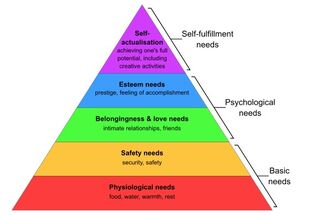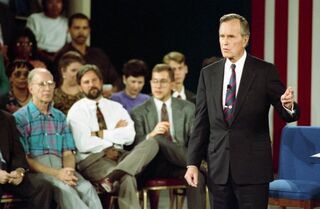Politics
Maslow's Hierarchy of Needs Explains the Midterm Elections
An old theory offers timeless wisdom for politics and governance.
Posted November 9, 2022 Reviewed by Ekua Hagan
Key points
- Maslow's Hierarchy of Needs, especially its emphasis on the need for food and personal safety, may best explain the will of the electorate.
- Higher food prices and a spike in crime made voters hungry for change because these issues threatened the "basic needs" in Maslow's hierarchy.
- A much anticipated "red wave" of Republican victories was blunted by the threat to abortion rights: a personal safety need for many women.

Tuesday's midterm elections—usually a referendum on the sitting president and his party—offered surprisingly mixed results, leaving many experts looking for an explanation. Though Democrats are projected to lose control of the House, giving Republicans control of the chamber for the first time in four years, the much-anticipated "red wave" never crested, and Democrats are currently favored to retain control of the Senate.
As a psychologist, I am more interested in why people vote as they do than I am in who they vote for, and early exit polls suggest that the issues voters most cared about were inflation, abortion, and crime, in that order. Though many pundits have struggled to find a common theme underlying this year's voter sentiments, I believe the answer is obvious and has been hiding in introductory psychology textbooks for decades: Abraham Maslow's famous theory regarding the Hierarchy of Needs (1943).
Maslow's Theory, Explained
Maslow's theory states that our human needs can be organized in a hierarchical system, often presented visually as a pyramid, such that our lower-order needs must be mostly satisfied before we're capable of appreciating and satisfying our higher-order needs. As shown in the diagram, starting from the base of the pyramid and moving upward, there are three sets of needs: Basic Needs, Psychological Needs, and Self-Fulfillment Needs. At the very bottom of the pyramid, within the category of Basic Needs, are Physiological Needs, which Maslow considered most fundamental, and one need, in particular, is highlighted above all others: the need for food. So important is our need for food that Maslow said this about its primacy:
"A person who is lacking food, safety, love, and esteem would most probably hunger for food more strongly than for anything else. If all the needs are unsatisfied, and the organism is then dominated by the physiological needs, all other needs may become simply non-existent or be pushed into the background."
Just above the physiological needs, but still within the category of Basic Needs, are Safety Needs, including the need for protection from danger, illness, chaos, and injustice. About the needs at this level, Maslow suggested that:
"The tendency to have some religion or world-philosophy that organizes the universe and the men in it into some sort of satisfactorily coherent, meaningful whole is also in part motivated by safety-seeking. Here too we may list science and philosophy in general as partially motivated by the safety needs."
As we move higher in the pyramid, we get into needs that are less tangible and less critical to our physical existence but necessary to live an enjoyable, if not meaningful, life. At the level of Psychological Needs we have Love and Belongingness Needs (e.g., friends, a romantic partner, children, etc.), followed by Esteem Needs (e.g., prestige and accomplishment). Finally, at the top of the pyramid, we have the Self-Fulfillment Needs, comprised of a single group: Self-Actualization Needs. Paraphrasing Kurt Goldstein, who coined the term, Maslow describes "self-actualization" as "the desire for self-fulfillment, namely, to the tendency for him to become actualized in what he is potentially."
Hierarchy of Needs and Politics
So what does Maslow's Hierarchy of Needs have to do with the midterm elections? For starters, it's a quick and helpful way to understand human psychology, including the psychology underlying our priorities and decisions. Right now in Ukraine, for instance, it's doubtful that many of the country's war-torn citizens are spending much time worrying about whether they're going to find their soulmate before 30, much less anything even approaching self-actualization: These things are luxuries beyond comprehension for most of them.
I don't think I'm going out on a limb by assuming that the average Ukrainian man, now forced to be a soldier in a war he didn't ask for, is much more concerned about where his next meal is coming from and surviving a Russian missile strike than he is about whether his chosen career (before the war) was fulfilling. And the average Ukrainian woman who has chosen to remain in the country is likely to be worried much more about the prospect of getting sexually assaulted by a Russian soldier than whether the lessons her kids are learning in school are aligned with her political values.
The Ukraine example is extreme, but sometimes we need to blow things out of proportion to make a point. In the past, trite electoral platitudes—like James Carville's famous line from 1992, "It's the economy, stupid"—might have explained a typical year's electoral results. But this year, the economy is strong, perhaps too strong, with unemployment near historic lows at 3.7 percent and wages continuing to rise. But the strong economy is obscuring the fact that inflation is higher than it's been since 1981, and this means that the prices that people are paying for food and gas are much higher than what they're used to. Taken together, though Americans are making more money, it's not enough to offset a larger rise in food and gas prices.

If we remember that Maslow said that food is the most fundamental of all our needs, we can understand why, historically, a common gauge of inflation throughout history has been the price of a gallon of milk. Before losing to Bill Clinton in 1992, George H. W. Bush famously didn't know, when asked during a debate, how much a gallon of milk cost. Today, it's not just milk, but virtually all of the food we might buy at a grocery store that's become so expensive. In my sessions with patients, I often hear how they've greatly scaled back on their spending on food: not just buying less food, but spending less on treats they enjoy, like a pint of Ben & Jerry's or going out to dinner, which are both luxuries. Passing up on that cute pair of heels is one thing, but food is a primary reinforcer, and even if a person isn't starving, they're likely to resent having to give up their comfort food.
Beyond food, safety concerns have also grown salient. Though violent crime is not near what it was in the 1970s, '80s, and '90s, we are certainly in the midst of a crime surge, and I can't remember a recent time when as many people knew someone within a degree of separation from themselves who has been criminally victimized in some way. The Democrats who actually acknowledge increases in crime blame COVID, weak gun laws, and political extremism, while Republicans blame bail reform laws, illegal immigration, and anti-police politics in blue cities.
Regardless of the causes of inflation or the recent spike in crime, blame is usually laid at the feet of the president. Right or wrong, the sitting president and his party are almost always given the majority of blame when voters are unhappy, as the president is the highest elected official in the land and his party is assumed to have the most power. Though President Biden has had a string of legislative successes—the infrastructure act, the climate/inflation reduction act, and the microchips act—and he's given credit, even by his political opponents, for uniting Europe against Russia after its invasion of Ukraine, the needs satisfied by these accomplishments reside on a higher rung on Maslow's pyramid than the need for food and safety.
But inflation and crime aren't the only threats to Americans' Basic Needs. After the overturn of Roe v. Wade in June, abortion rights—which Maslow might list under safety needs, as it relates to the safety to choose what is done to one's own body—became threatened. As noted above, abortion was the second-leading issue motivating voters, and women of both parties were energized enough by the threat to abortion rights that a much-expected Republican "red wave" was significantly blunted.
For now, it seems, we can reject the notion that this election simply came down to the old notion that "It's the economy, stupid." Moving forward, perhaps we should amend Carville's line to reflect a more nuanced perspective: It's the hierarchy of needs, genius!
References
Maslow, A.H. (1943). A Theory of Human Motivation Psychological Review, 50, 370-396.




